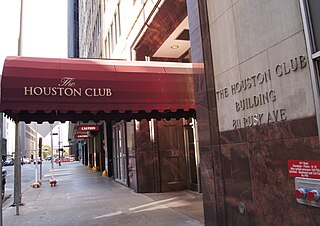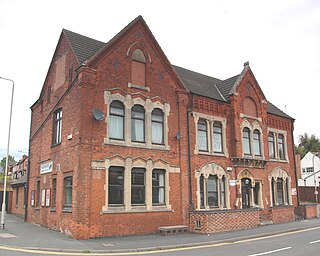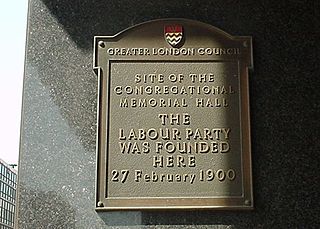
The Liberal Party was one of the two major political parties in the United Kingdom, along with the Conservative Party, in the 19th and early 20th centuries. Beginning as an alliance of Whigs, free trade–supporting Peelites, and reformist Radicals in the 1850s, by the end of the 19th century, it had formed four governments under William Gladstone. Despite being divided over the issue of Irish Home Rule, the party returned to government in 1905 and won a landslide victory in the 1906 general election. Under prime ministers Henry Campbell-Bannerman (1905–1908) and H. H. Asquith (1908–1916), the Liberal Party passed reforms that created a basic welfare state. Although Asquith was the party leader, its dominant figure was David Lloyd George.

The Campaign for Real Ale (CAMRA) is an independent voluntary consumer organisation headquartered in St Albans, England, which promotes real ale, cider and perry and traditional British pubs and clubs. With just under 150,000 members, it is the largest single-issue consumer group in the UK, and is a founding member of the European Beer Consumers Union (EBCU).

The Independent Labour Party (ILP) was a British political party of the left, established in 1893 at a conference in Bradford, after local and national dissatisfaction with the Liberals' apparent reluctance to endorse working-class candidates. A sitting independent MP and prominent union organiser, Keir Hardie, became its first chairman.

The Scottish Trades Union Congress (STUC) is the national trade union centre in Scotland. With 40 affiliated unions as of 2020, the STUC represents over 540,000 trade unionists.

The 1874 United Kingdom general election saw the incumbent Liberals, led by William Gladstone, lose decisively, even though their party won a majority of the votes cast. Benjamin Disraeli's Conservatives won the majority of seats in the House of Commons, largely because they won a number of uncontested seats. It was the first Conservative victory in a general election since 1841. Gladstone's decision to call an election surprised his colleagues, for they were aware of large sectors of discontent in their coalition. For example, the nonconformists were upset with education policies; many working-class people disliked the new trade union laws and the restrictions on drinking. The Conservatives were making gains in the middle-class, Gladstone wanted to abolish the income tax, but failed to carry his own cabinet. The result was a disaster for the Liberals, who went from 387 MPs to only 242. Conservatives jumped from 271 to 350. Gladstone himself noted: "We have been swept away in a torrent of gin and beer".
Young Liberals is the youth and student organisation of the British Liberal Democrats. Membership is automatic for members of the Liberal Democrats aged under 30. It organises a number of fringe events at the Liberal Democrat Conference, which is held twice each year.

The Congress of South African Trade Unions is a trade union federation in South Africa. It was founded in 1985 and is the largest of the country's three main trade union federations, with 21 affiliated trade unions.
The Queensland Council of Unions (QCU) is the peak body of trade union organisations, also known as a labour council, in Queensland, Australia.
The Cambridge University Labour Club (CULC), formerly known as Cambridge Universities Labour Club, is a student political society, first founded as the Cambridge University Fabian Society to provide a voice for British Labour Party values of socialism and social democracy at the University of Cambridge. Although the society served only University of Cambridge students for most of its history, in 2007, membership was also opened up to students of Anglia Ruskin. In 2018, with the setting up of a student society for Labour members at Anglia Ruskin, the society reverted to existing for Cambridge University students only. CULC's varied past has seen it go through several disaffiliations with the national Labour Party, including periods in the 1960s and 1970s when it was under the influence of the entryist Militant tendency. It is currently affiliated to the Labour Party and the Cambridge Constituency Labour Party.

Australia's universities are home to a variety of different student union groups, providing a range of political, commercial and other services to students. The sector has undergone substantial change in recent years, with a decline in participation, intervention by university administrations, and the end of compulsory membership arrangements.
The Miners' Federation of Great Britain (MFGB) was established after a meeting of local mining trade unions in Newport, Wales in 1888. The federation was formed to represent and co-ordinate the affairs of local and regional miners' unions in England, Scotland and Wales whose associations remained largely autonomous. At its peak, the federation represented nearly one million workers. It was reorganised into the National Union of Mineworkers in 1945.

A social club may be a group of people or the place where they meet, generally formed around a common interest, occupation or activity. Examples include book discussion clubs, chess clubs, country clubs, final clubs, fishing clubs, gaming clubs, women's clubs, gentlemen's clubs, hunting clubs, military officers' clubs, political clubs, religious clubs, science clubs and university clubs. The term can also refer to a criminal headquarters, such as the Ravenite Social Club or the Cage.

Working men's clubs are British private social clubs first created in the 19th century in industrial areas, particularly the North of England, Midlands, Scotland, Northern Ireland and South Wales Valleys, to provide recreation and education for working class men and their families.

The Association of Conservative Clubs is an organisation associated with the Conservative Party in the United Kingdom. It represents and provides support to the largest association of political clubs in the country estimated at 1,100.

The Social Democratic Workers' Party was a Dutch socialist political party existing from 1894 to 1946, and a predecessor of the social democratic Labour Party.

The Women's Liberal Federation was an organisation that was part of the Liberal Party in the United Kingdom.

The Sheffield Trades and Labour Council, usually known as the Sheffield Trades Council, is a labour organisation uniting trade unionists in Sheffield.

Socialism in the United Kingdom is thought to stretch back to the 19th century from roots arising in the English Civil War. Notions of socialism in Great Britain have taken many different forms from the utopian philanthropism of Robert Owen through to the reformist electoral project enshrined in the Labour Party that was founded in 1900 and nationalised a fifth of the British economy in the late 1940s.

The Labour Representation Committee was a pressure group founded in 1900 as an alliance of socialist organisations and trade unions, aimed at increasing representation for labour interests in the Parliament of the United Kingdom. The Labour Party traces its origin to the LRC's foundation.

















